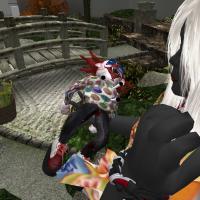In Voodoo, they call ones patron loa “master of the head”, and even if you aren’t called upon to be a priest or anything, they still often identify a master of the head for a person.
Is “master of the head” similar to discursive thought? I imagine so, just without the abstract model of thought. They objectify their experience.
They feel ones primary duty is to preserve their friendship with the master of the head. This is how one grows personally. One loa in particular is a warrior spirit, hot headed. So if your master of the head is this warrior spirit, the village priest would offer guidance in how to preserve peace between you and this spirit, because this would preserve your personal power or spiritual strength. Now when the village itself seemed to be experiencing an upheaval, they would organize a communal ceremony, and through their dance they would see the behaviour of the spirits and the balance between them in their community.
It sounds very Native American. American Voodoo incorporated Native American practices.
I start to see that human beliefs are not so separated. Many cultures blend to form new ideas. Voodoo is basically pagan, and they see nothing wrong with adapting their understanding and practices to involve the local spirits. So the complication comes from the question, “What’s not Voodoo?” They don’t see things as not Voodoo, and the term pagan comes from the Latin paganus, meaning people of the land. It was a word they used to refer to the “local yokels” as some say today.
Do they use dance to shift the energy? They use dance to reveal the energy. Not everyone in a ceremony dances or is expected to dance. They call the dancing “being ridden”, and it is believed that if your master of the head wants to express themselves, then you will dance.
They are ridden by the spirits? Yes. They dance as fully as they can, until they sort of “fall out”, settle into an ecstatic state, not necessarily literally falling down. Then they observe the behaviour of the dancer.
Similar, in a way, to Sufi dancing. “Whirling dervishes.” Yes. If your master of the head happens to be Baron Samedi, you will behave as he would behave for a time after the dance, and many spirits can surface during a single ceremony. Those not dancing watch the dance and interact with anyone in an ecstatic state.
Loa of the dead? Yes. If Legba and the Baron seem to be arguing, they try to resolve that. If Obatala and Dambala are having a conversation, they listen to that, try to learn what they can, and make offerings of whatever they can that the spirit asks for. Baron Samedi likes whiskey and cigars, for example, and often the person who has him as their patron loa won’t drink or smoke at all. Each spirit asks for something that the people share in, food or drink or specific items of clothing. In Voodoo, the loa don’t exist as beings “more holy than” humans. They are just stronger, more ashe, more power.
How do you “give” a specific item, food, clothing, to the spirit? By giving it to their “horse”, the dancer who serves them, and often only temporarily.
So, the items are given to the human individual whom the spirit is “riding.” Yes, or left as an offering at a shrine, but shrines are maintained outside of ceremony as contact points. A “house” for ones patron spirit.
I guess Voodoo has had a spooky reputation that it probably hasn’t earned. And it’s probably abused by those that call it devils work. Indeed.
Does a spirit tend to stay with the same person as a companion perhaps? Ah, yes indeed, but that persons companion is not always the one who rides them during ceremony. The spirits form friendships between themselves also. So though one individual might be in Legba’s “family”, it may be a different spirit that surfaces in them when they dance. They recognize which spirit it is by behaviour and physical symptoms. They dance to open the door, to open the body.
Like meditation? Yes. They meditate as well in a free-form sort of way. They dialogue in private with their patron.
What about the zombies? Ah, zombie is just their word for spirit. A zombie was a lost spirit, often an angry ancestor, sometimes a minor spirit of a specific place.
Your thoughts are welcome. Be well friends.
Travis Saunders
Dragon Intuitive
~science,mysticism,spirituality~

